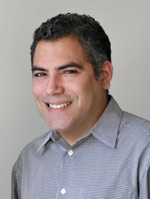 I‘ve been listening lately to the posthumous single “Rie y Llora” (“Laugh and Cry”) by Celia Cruz, the Queen of Salsa. “Laugh, cry / To each his time comes” go
the lyrics in Spanish, which are all the more poignant because she recorded the song while dying from cancer.
I‘ve been listening lately to the posthumous single “Rie y Llora” (“Laugh and Cry”) by Celia Cruz, the Queen of Salsa. “Laugh, cry / To each his time comes” go
the lyrics in Spanish, which are all the more poignant because she recorded the song while dying from cancer.
As a first-generation Cuban American, such sentimentality and strength are very
familiar to me. Those characteristics are not unique to Latinos, but we do tend to have lots of both—and they allow for our clichéd but true reverence of family and tradition.
So it’s quite hurtful when family rejects us for being “nontraditional.” We get through it, but not without some turmoil. Such was the case for Daniel Leon, our cover guy. As a young gay Latino, he already had a lot to deal with when he tested HIV positive. Such also was the case for Norma Azúcar. As a widow who fell into depression and became a heroin user, she also had plenty on her plate when she received her HIV diagnosis.
The HIV/AIDS epidemic among Latinos is disproportionate, but there are reasons to worry it may get worse. Latinos are the most likely to be tested late for HIV, which means we are the group who most often develops AIDS within 12 months of diagnosis.
The situation for Latino men who have sex with men in particular is even more worrisome. By population, after white gay men and black gay men, Latino gay men are the third most affected group in new HIV cases. Black women dropped down to fourth place.
Click here to read more about how the virus continues to affect Latinos across the country, including Daniel and Norma, and to explore the question: Are Latinos the next wave of the epidemic?
The Latino Commission on AIDS (LCOA) is one of the most prominent organizations dedicated to raising awareness and providing education about the virus to Latinos. Click here to read our Q&A with LCOA president Guillermo Chacón on the future of the organization.
A delicate matter for Latinos and other groups who tend not to circumcise their males is whether the procedure should be considered for HIV prevention. Major studies support circumcision as prevention in Africa, but a small yet vocal group believes the science is flawed. Click here to find out if circumcision could lower U.S. HIV rates.
Rie y Llora





Comments
Comments